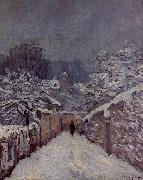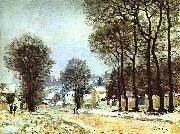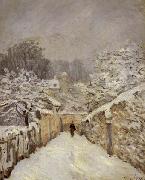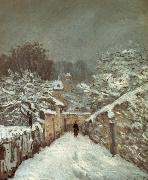
|
Alfred Sisley
|
|||
|
|
|||
| French 1839-1899 Alfred Sisley Galleries Alfred Sisley (October 30, 1839 ?C January 29, 1899) was an English Impressionist landscape painter who was born and spent most of his life in France. Sisley is recognized as perhaps the most consistent of the Impressionists, never deviating into figure painting or finding that the movement did not fulfill his artistic needs. Sisley was born in Paris to affluent English parents; William Sisley was in the silk business, and his mother Felicia Sell was a cultivated music connoisseur. At the age of 18, Sisley was sent to London to study for a career in business, but he abandoned it after four years and returned to Paris. Beginning in 1862 he studied at the atelier of Swiss artist Marc-Charles-Gabriel Gleyre, where he became acquainted with Fr??d??ric Bazille, Claude Monet, and Pierre-Auguste Renoir. Together they would paint landscapes en plein air (in the open air) in order to realistically capture the transient effects of sunlight. This approach, innovative at the time, resulted in paintings more colorful and more broadly painted than the public was accustomed to seeing. Consequently, Sisley and his friends initially had few opportunities to exhibit or sell their work. Unlike some of his fellow students who suffered financial hardships, Sisley received an allowance from his father??until 1870, after which time he became increasingly poor. Sisley's student works are lost. His earliest known work, Lane near a Small Town is believed to have been painted around 1864. His first landscape paintings are sombre, coloured with dark browns, greens, and pale blues. They were often executed at Marly and Saint-Cloud. | |||
|
|
|||
|
Snow at Louveciennes Alfred Sisley3.jpg Painting ID:: 3811 |
1878 Musee d'Orsay, Paris | ||
|
|
|||
|
Alfred Sisley
|
|||
|
|
|||
| French 1839-1899 Alfred Sisley Galleries Alfred Sisley (October 30, 1839 ?C January 29, 1899) was an English Impressionist landscape painter who was born and spent most of his life in France. Sisley is recognized as perhaps the most consistent of the Impressionists, never deviating into figure painting or finding that the movement did not fulfill his artistic needs. Sisley was born in Paris to affluent English parents; William Sisley was in the silk business, and his mother Felicia Sell was a cultivated music connoisseur. At the age of 18, Sisley was sent to London to study for a career in business, but he abandoned it after four years and returned to Paris. Beginning in 1862 he studied at the atelier of Swiss artist Marc-Charles-Gabriel Gleyre, where he became acquainted with Fr??d??ric Bazille, Claude Monet, and Pierre-Auguste Renoir. Together they would paint landscapes en plein air (in the open air) in order to realistically capture the transient effects of sunlight. This approach, innovative at the time, resulted in paintings more colorful and more broadly painted than the public was accustomed to seeing. Consequently, Sisley and his friends initially had few opportunities to exhibit or sell their work. Unlike some of his fellow students who suffered financial hardships, Sisley received an allowance from his father??until 1870, after which time he became increasingly poor. Sisley's student works are lost. His earliest known work, Lane near a Small Town is believed to have been painted around 1864. His first landscape paintings are sombre, coloured with dark browns, greens, and pale blues. They were often executed at Marly and Saint-Cloud. | |||
|
|
|||
|
Snow at Louveciennes Alfred Sisley11.jpg Painting ID:: 3819 |
1874 | ||
|
|
|||
|
Alfred Sisley
|
|||
|
|
|||
| French 1839-1899 Alfred Sisley Galleries Alfred Sisley (October 30, 1839 ?C January 29, 1899) was an English Impressionist landscape painter who was born and spent most of his life in France. Sisley is recognized as perhaps the most consistent of the Impressionists, never deviating into figure painting or finding that the movement did not fulfill his artistic needs. Sisley was born in Paris to affluent English parents; William Sisley was in the silk business, and his mother Felicia Sell was a cultivated music connoisseur. At the age of 18, Sisley was sent to London to study for a career in business, but he abandoned it after four years and returned to Paris. Beginning in 1862 he studied at the atelier of Swiss artist Marc-Charles-Gabriel Gleyre, where he became acquainted with Fr??d??ric Bazille, Claude Monet, and Pierre-Auguste Renoir. Together they would paint landscapes en plein air (in the open air) in order to realistically capture the transient effects of sunlight. This approach, innovative at the time, resulted in paintings more colorful and more broadly painted than the public was accustomed to seeing. Consequently, Sisley and his friends initially had few opportunities to exhibit or sell their work. Unlike some of his fellow students who suffered financial hardships, Sisley received an allowance from his father??until 1870, after which time he became increasingly poor. Sisley's student works are lost. His earliest known work, Lane near a Small Town is believed to have been painted around 1864. His first landscape paintings are sombre, coloured with dark browns, greens, and pale blues. They were often executed at Marly and Saint-Cloud. | |||
|
|
|||
|
Snow at Louveciennes new2/Alfred Sisley-674425.jpg Painting ID:: 27243 |
mk55 1875 Oil on canvas 61x50.5cm Musee d Orsay,Paris | ||
|
|
|||
|
Jean-Antoine Watteau
|
|||
|
|
|||
| 1684-1721 Antoine Watteau Art Locations He is best known for his invention of a new genre, the fete galante, a small easel painting in which elegant people are depicted in conversation or music-making in a secluded parkland setting (see under FETE CHAMPETRE). His particular originality lies in the generally restrained nature of the amorous exchanges of his characters, which are conveyed as much by glance as by gesture, and in his mingling of figures in contemporary dress with others in theatrical costume, thus blurring references to both time and place. Watteau work was widely collected during his lifetime and influenced a number of other painters in the decades following his death, especially in France and England. His drawings were particularly admired. Documented facts about Watteau life are notoriously few, though several friends wrote about him after his death (see Champion). Of over two hundred paintings generally accepted as his work | |||
|
|
|||
|
Snow at louveciennes new10/Jean-Antoine Watteau-349485.jpg Painting ID:: 34734 |
mk96 1875 61x50.5cm | ||
|
|
|||
|
Also Buy::. For Following Paintings / Artists / Products, Please Use Our Search Online: |











